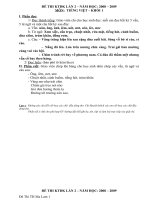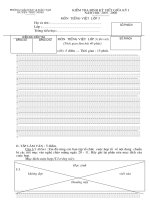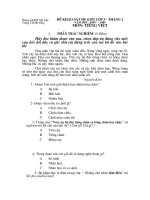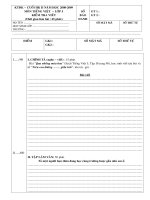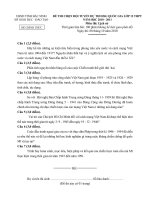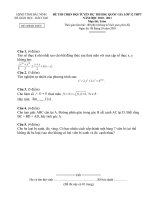De DA chon HSGQG mon Tieng AnhBN20102011
Bạn đang xem bản rút gọn của tài liệu. Xem và tải ngay bản đầy đủ của tài liệu tại đây (177.68 KB, 12 trang )
<span class='text_page_counter'>(1)</span><div class='page_container' data-page=1>
UBND TỈNH BẮC NINH
SỞ GIÁO DỤC - ĐÀO TẠO
<b>Đề thi chọn đội tuyển dự thi HsG quốc gia lớp 12 thpt</b>
<b>NĂM HỌC 2010 - 2011</b>
<b>Mụn thi: Tiếng Anh</b>
Thời gian làm bài: 180 phỳt <i>(không kể thời gian phát đề)</i>
Ngày thi: 08 tháng 10 năm 2010
<b>==========</b>
<b>Điểm bài thi: Bằng số ………… Bằng chữ…</b>………
<b>Chữ ký của người chấm thi:</b>
<b>Số 1 ………..</b>
<b>Số 2: ……….</b>
<b>(Thớ sinh làm bài trực tiếp trên đề thi)</b>
<b>SECTION I. PHONOLOGY (20 PTS)</b>
<i><b>Part I. Find the word whose bold part is pronounced differently. Circle the letter preceding the</b></i>
<i><b>correct answer (A, B, C or D). (10 pts)</b></i>
1. A. manufacture B. mature C. pasture D. agriculture
2. A. explanation B. preparation C. observatory D. cooperation
3. A. southern B. mathematics C. breathe D. trustworthy
4. A. sergeant B. servant C. service D. sermon
5. A. recite B. reconcile C. refund D. reproduce
6. A. foot B. stood C. wood D. food
7. A. explosion B. exploration C. expertise D. expedition
8. A. chooses B. increases C. releases D. practises
9. A. procedure B. programme C. progress D. profile
10. A. sacred B. embedded C. ragged D. shrugged
<i><b>Part 2. Identify the word whose stress pattern is different from that of the other words in the same</b></i>
<i><b>group. Circle the letter preceding the correct answer (A, B, C or D). (10 pts)</b></i>
1. A. trigonometry B. explanatory C. immediately D. democracy
2. A. argumentative B. psychological C. contributory D. hypersensitive
3. A. assassinate B. equality C. intelligence D. understanding
4. A. majority B. ceremony C. astronomy D. opinion
5. A. managerial B. determination C. unbelievable D. inability
6. A. tropical B. commercial C. disastrous D. extensive
7. A. experience B. hurricane C. volcano D. material
8. A. accept B. unique C. successful D. laughter
9. A. independence B. politician C. immortality D. socialism
10. A. confer B. offer C. prefer D. deter
<b>SECTION II: LEXICO – GRAMMAR. (45 PTS)</b>
<i><b>Part 1: Choose the word or phrase that best completes each sentence. Circle the letter preceding the</b></i>
<i><b>correct answer (A, B, C or D). (5 pts)</b></i>
1. Thousands of _______ are already signing up for this new telephone service.
A individuals B subscribers C applicants D interviewees
2. This is a _______ example of what not to do.
A critical B pure C simple D prime
3. Job losses are mainly in the _______ sectors of the industry.
A blue-collar B red-collar C stiff-collar D high-collar
4. Unfortunately she has been given an _______ task.
A insurmountable B undeveloped C inoperable D unsolved
5. It was a big _______ for her to give up her acting career to look after her family.
A trial B sacrifice C endeavour D test
ĐỀ CHÍNH THỨC
</div>
<span class='text_page_counter'>(2)</span><div class='page_container' data-page=2>
6. They are showing a _______ of a 1930’s musical at the Theatre Royal.
A resurrection B revival C retake D repeat
7. The students at this university are _______ in blocks of flats on the campus.
A housed B domiciled C resident D placed
8. I have no wish to have any _______ with a firm like that.
A openings B handling C dealings D contacts
9. Voters find it difficult to believe politicians because the latter use so many _______ doctors.
A twist B spin C turn D spinning
10.We are told there will be little economic _______ this year.
A progress B forwards C movements D progression
<i><b>Part 2: Use the correct form of the words given in brackets to fill in the space. (5 pts) </b></i>
1. Human beings are the worst (pollute)_______________ on earth.
2. No one can understand Lewis’s behaviour. It’s (explain)_______________.
3. She is very efficient, and (fail)_______________ polite to customers.
4. I have always (envious)_______________ your lifestyle.
5. After the (taking)_______________ several employees lost their jobs.
6. The cost of (carry)_______________ must be paid by the buyer.
7. Diseased cells must be killed while their neighbours are left (harm)_______________.
8. Nobody gets (prefer)_______________ treatment in this office.
9. People used to suffer from life-time physical (normal
<b>)</b>
_______________
<b>.</b>10. She died in (child
<b>)</b>
_______________
<b>.</b>
<i><b>Part 3: The passage below contains 10 mistakes. Find them and correct them. Write your answers</b></i>
<i><b>in the space provided below the passage. (10 pts)</b></i>
As we feel tired at bed-time, it is natural to assume that we sleep because we are tired. The point
seems so obviously that hardly anyone has ever sought to question it. Nevertheless, we must ask “tired
of what?” People certainly feel tired in the end of a hard day’s manual work, but it is also true that
office workers feel equally tired when bed-time come. Even invalids, confined to beds or wheelchairs,
become tired as the evening wears on. Moreover, the manual workers will still feel tired even after an
evening spent relaxing in front of the television or read a book, activities which ought to have a
refreshing effect. There is no proof connection between physical exertion and the need for sleep.
People want to sleep, however little exercises they have had. Nor is the desire for sleep relating to
mental fatigue. In fact, sleep comes more slowly to people who have had an intellectual stimulating
day, just because their minds are still full in thoughts when they retire. Ironically, one way of sending
someone to sleep is to put him or her into boring situation where the intellectual effort is minimal.
<b>Your answers: </b>
1. __________________ __________________ 6. __________________ __________________
2. __________________ __________________ 7. __________________ __________________
3. __________________ __________________ 8. __________________ __________________
4. __________________ __________________ 9. __________________ __________________
5. __________________ __________________ 10. __________________ __________________
<i><b>Part 4: Put the verb in parentheses in the correct tense or form. The word in italics should be put in</b></i>
<i><b>the correct position in relation to the verb. (10 pts)</b></i>
</div>
<span class='text_page_counter'>(3)</span><div class='page_container' data-page=3>
cross)____________ busy streets 11<sub>(go)____________ to school. Housewives </sub>12<sub>(can</sub>
visit)____________ shopping centres on foot, for in these specially 13<sub>(design)____________ living</sub>
areas, cars 14<sub>(be) ______________ unnecessary. At first, the government </sub>15<sub>(have)____________ great</sub>
difficulties in 16<sub>(persuade)_____________ people to leave Rio and </sub>17<sub>(settle)____________ in Brasilia.</sub>
Since 1960, however, the population 18<sub>(grow)____________ all the time. Brasilia quickly</sub>
19<sub>(establish)_____________ itself as the capital of the country. The idea to have the capital moved so</sub>
far inland 20<sub>(have)_____________ a great effect on the future of Brazil.</sub>
<b>Your answers: </b>
1. _________________ 6. _________________ 11. _______________ 16. ________________
2. _________________ 7. _________________ 12. _______________ 17. ________________
3. _________________ 8. _________________ 13. _______________ 18. ________________
4. _________________ 9. _________________ 14. _______________ 19. ________________
5. _________________ 10. ________________ 15. _______________ 20. ________________
<i><b>Part 5: Insert </b></i><b>a, an, the or ỉ</b><i><b> (no article) in each of the numbered blanks. (5 pts)</b></i>
A lot of pressures are encouraging you to worry about your appearance. Women’s magazines, (1)
______ advertisements and (2) ______ media all concentrate on (3) ______ subject, and they bombard
you with (4) ______ warnings about (5) ______ bad breath, perspiration, being too fat or too thin.
They even give (6) ______ impression that if you use (7) ______ certain shampoo or cosmetic, you
will become attractive to (8) ______ boys. Your parents may become involved in this process by
encouraging you to think about your appearance, and your friends may create (9) ______ atmosphere
of (10) _______ competition.
<i><b>Part 6: Fill in each gap with a suitable preposition. (10 pts)</b></i>
The star (1)_______ the largest scale opera performance over staged (2)_______ Britain pull out
(3)_______ its opening night (4)_______ Sunday. Yerdi’s Aida is being performed (5)_______
London’s Earl’s Court Arena (6)_______ a cast of 600 singers, dancers and actors. American soprano
Grace Bumbry (7)_______ the title role was suffering (8)_______ hay fever, but had promised to be “
all right on the night even if my nose drops like the Nile”. Half way (9)_______ the performance she
was unable to continue and was replaced (10)_______ mid-performance (11)_______ Russian soprano
Ghena Dimitrova who was sitting (12)_______ the audience watching the show . She was taken
(13)_______ a dressing room where she put on Ms Bumbry costume and was made up. She was ready
to go (14)_______ the stage (15)_______ a longer than usual interval.
Tuesday’s performance (16)_______ the presence (17)_______ the Prince and Princess of Wale
will go ahead (18)_______ Ms Bumbry- her role will be taken (19)_______ Martina Arroyo
(20)_______ Italy.
<b>SECTION III. READING. (65 PTS)</b>
<i><b>Part 1: Read the following passage and circle the letter preceding the correct answer (A, B, C, or D)</b></i>
<i><b>which best fits each gap. (15 pts)</b></i>
<b>TWO CREATURES OF THE PAST - MAMMOTHS AND MASTODONS</b>
</div>
<span class='text_page_counter'>(4)</span><div class='page_container' data-page=4>
To most of us, mammoths are probably the most (8)_______ of the elephant’s extinct relatives, but
thousands of years earlier, in the woodlands of eastern North America, lived another of the elephant’s
relatives called the mastodon. Like mammoths, mastodon may also have had a hairy coat, but
(9)_______ mammoths mainly ate grass on the plains, mastodons (10)_______ to eat twigs and leaves.
We do not know why mastodons (11)_______ extinct. However, computer studies of the decrease
in mammoth (12)_______ suggest that it was a particular (13)_______ of over-hunting by humans,
and (14)_______ in the climate at that time which (15)_______ to their disappearance.
1. A. made B. took C. did D. had
2. A. rather B. quite C. just D. well
3. A. watching out B. watching over C. looking after D. looking out
4. A. across B. away C. out D. past
5. A. grew B. felt C. found D. experienced
6. A. increasing B. reaching C. expanding D. completing
7. A. put B. held C. set D. kept
8. A. usual B. frequent C. regular D. familiar
9 A. when B. while C. as D. even
10. A. preferred B. enjoyed C. desired D. selected
11. A. turned B. went C. became D. came
12. A. quantities B. amounts C. totals D. numbers
13. A. combination B. addition C. attachment D. connection
14. A. transformations B. changes C. diversions D. adjustments
15. A. guided B. caused C. led D. influenced
<i><b>Part 2: Read the following passage and circle the correct answer (marked A, B, C, or D) to each of</b></i>
<i><b>the questions that follow. (20 pts) </b></i>
My lawyer, Mr. Turner, is the only man I know who has seen a ghost. He is a quiet even-tempered
man whose life is spent in dealing with facts. He is the last person in the world to give way to fantasy.
He has a wife and two children of whom he is proud, takes a modest holiday abroad every year and
spends his Sundays gardening. He is knowledgeable about art and architecture, though he doesn't
pretend to be an expert by any means. It is, therefore, all the more surprising that he should so insistent
about the ghost. It happened, so he says, like this:
He was travelling from London to the North of England by train. It was a misty November evening
and the train was half empty. In fact for the first part of the journey Mr. Turner had the carriage to
himself and sat dozing over a newspaper. However at the first stop a passenger jumped in, slamming
the door behind him. He seemed out of breath as if he had been running. He was a striking looking
young man with dark, bushy hair and bright intelligent eyes. He was dressed rather oddly in a long
waisted coat with silver buttons, tight trousers and an embroidered waistcoat. Mr. Turner did not pay
much attention to this because people wear all sorts of extravagant clothes these days and he had long
grown accustomed to them.
Presently, the two men got into conversation, as people do on long journeys. Mr. Turner was
interested to cover that the young man was very knowledgeable about Art - in particular portraits. His
name, he said, was Joseph Hart, and he was on his way to visit an exhibition. It seemed that he worked
in a famous London Art Gallery - a picture restorer, perhaps, thought Mr. Turner, for he seemed to
know a great deal about varnishes and paints, and even more about the subjects of certain portraits.
When Mr. Turner asked his opinion of the portrait of a famous judge by an artist he admired, his
companion laughed and said, “He’s only a reproduction - a good one I agree but you can't talk to a
reproduction.” He spoke as though the person in the portrait were still living.
After a while the carriage got hot and steamy and Mr. Turner dropped off. He woke up just as the
train was drawing up at a junction with a grinding of brakes. His companion had disappeared.
</div>
<span class='text_page_counter'>(5)</span><div class='page_container' data-page=5>
waistcoat. The eyes smiled at him with a hint of amusement. The name-plate at the foot of the picture
read: <i>Joseph Hart, Gentleman, 1800-1835</i>.
1. What kind of person was Mr. Turner?
A. imaginative B. fantastic C. sensible D. insensitive
2. Although he was a lawyer, Mr. Turner _______.
A. pretended to know a lot about Art. B. knew something about Art.
C. pretended to take an interest in Art. D. intended to learn more about Art.
3. When the passenger entered Mr. Turner’s compartment _______.
A. he was painting. B. he was running.
C. the train was just leaving. D. the carriage was half-empty.
4. The passenger’s clothes didn’t seem strange to Mr. Turner because _______.
A. he was used to wearing strange clothes. B. he liked people who wore strange clothes.
C. everyone he knew wore strange clothes. D. he had seen a lot of people in strange clothes.
5. Mr. Turner thought the young man might _______.
A. be an Art Dealer. B. be an Art Expert.
C. renew old pictures. D. paint reproductions of old pictures.
6. Why wouldn’t the passenger give an opinion on the portrait of the judge?
A. the judge wasn’t alive. B. the judge was still alive.
C. the picture was a copy. D. he hadn’t seen it.
7. When did Mr. Turner first realize that the passenger had gone?
A. When the train started. B. After the train had stopped.
C. Just before the train stopped. D. When the train was leaving the station.
8. Why did Mr. Turner go into the Art Gallery?
A. He was walking past there. B. He had never been there before.
C. He had planned to do so. D. He suddenly decided to.
9. In the past of the gallery that Mr. Turner was directed to _______.
A. there were a lot of pictures by unknown people.
B. there were a lot of nineteenth century people.
C. no-one else was looking at the pictures.
D. he only saw one portrait.
10. When Mr. Turner looked at the portrait of Joseph Hart _______.
A. he smiled at it. B. he thought it smiled at him.
C. he didn’t recognize it. D. he was amused.
<i><b>Part 3: Fill each numbered blank in the following passage with one most suitable sentence given in </b></i>
<i><b>the list below. (10 pts) </b></i>
Food is one of the things we notice about different cultures. It is also one of the first aspects of a
different culture we feel to adopt. The table manners that accompany the food are not so obvious.
When the behaviors of a culture are visibly in contrast, they are most powerful, even when we are not
aware of them. (1)_______.
In Australia, it is expected that everyone will talk during a meal. The talking passes from one
person to another and is often about an issue that has been in the news, a new movie, or some other
neutral and safe topics. (2)_______. Conversation is held before or after the meal itself.
(3)_______. In Australia, when we have finished eating the main course we put the knife and fork
across the middle of the plate parallel to each other with the handles facing towards us. When we are
resting during the meal, we put the knife and fork across each other on the middle of the plate.
(4)_______. In Indonesia, some students tell me, the fork and the spoon are crossed as in Australian
resting position. But not all Indonesians may do this. Indonesia is itself a very multicultural society, so
there may be a number of customs for this within the country.
</div>
<span class='text_page_counter'>(6)</span><div class='page_container' data-page=6>
A. After the meal, the way we place our eating tools, our knives, forks, or chopsticks, is also culturally
defined.
B. This expresses a different relationship between people and shows lines of community in contrast to
the Westerner’s separate plates.
C. In many Eastern cultures, it is considered impolite to speak while the meal is in progress.
D. Then there the complex issue of accepting or declining an offer.
E. We need to remember that table manners change within cultures.
F. A barbecue or a dinner with a few friends will have different rules.
G. In China, the chopsticks go crossways across the top of the plate with the handles facing towards
the right, as that is the hand that holds the chopsticks.
H. Just imagine some of the different table manners we might encounter at a class dinner when a
range of cultures are represented!
<b>Your answers:</b>
1.____________ 2. _____________ 3._____________ 4._____________ 5._____________
<i><b>Part 4: Fill each blank with ONE suitable word. Write your answers in the provided space below the</b></i>
<i><b>passage. (20 pts)</b></i>
He was born in a very poor part of London. His father (1) ______ a comedian and his mother
worked (2)______ a dancer and singer. (3)______ of them was very successful, however, and the
family had very (4)______ money; at one time they were (5)______ poor that he and his brothers had
only one pair of shoes (6)______ them and they had to take turns wearing them. The first time he
himself earned any money (7)______ dancing and singing, he was only five years old. He did many
kinds of jobs, but what he loved (8)______ was working in the theatre.
(9)______ he was about 15 he joined a travelling theatre company and went on trips to America. On
(10) ______ such tour he was offered a part in a film, so he went to Hollywood, (11)______ he
eventually became both an actor and a film director. He was known to be a perfectionist and
sometimes (12)______ the other actors repeat a scene many times (13)______ he was finally satisfied
with it.
Many people found (14) ______ difficult and some accused him of (15)______ mean, but it was
really his early experiences of poverty (16)______ made him careful with his (17)______
He died in Switzerland in 1977, (18) ______ the age of 88. (19)______ is now a statue of him in
Leicester Square, London, the city of his (20)______ and early upbringing. His name was Charlie
Chaplin.
<b>Your answers: </b>
1. _________________ 6. _________________ 11. _______________ 16. ________________
2. _________________ 7. _________________ 12. _______________ 17. ________________
3. _________________ 8. _________________ 13. _______________ 18. ________________
4. _________________ 9. _________________ 14. _______________ 19. ________________
5. _________________ 10. ________________ 15. _______________ 20. ________________
<b>SECTION IV: WRITING. (70 PTS)</b>
<i><b>Part 1: Finish the second sentence in such a way that it means the same as the sentence printed</b></i>
<i><b>before. (10 pts)</b></i>
1. The news that he would be going to university pleased his parents very much.
The news of______________________________________________________________________
2. We must think about ways of improving the transport system.
Thought must _____________________________________________________________________
3. It isn’t possible that Jane was absent from work today.
</div>
<span class='text_page_counter'>(7)</span><div class='page_container' data-page=7>
The_____________________________________________________________________________
5. It doesn’t matter which chemical you put into the mixture first. The result will be the same.
It makes_________________________________________________________________________
<i><b>Part 2: Write a new sentence so that it has the same meaning as the original sentence, using the</b></i>
<i><b>word in capital letters. This word must not be altered in any way. (10 pts)</b></i>
1. They claim to provide the best service in business, but I think that can be questioned. (DISPUTE)
________________________________________________________________________________
________________________________________________________________________________
2. The boy does whatever his father wants in an obedient way. (ATTENDANCE)
________________________________________________________________________________
3. You must make allowances for his inexperience. (ACCOUNT)
________________________________________________________________________________
4. I really don’t know what you’re talking about. (FAINTEST)
________________________________________________________________________________
5. You must accept the fact that she has left you. (TERMS)
<b>________________________________________________________________________________</b>
<i><b>Part 3: Write a report for a university lecturer describing the information in the graph below. You</b></i>
<i><b>should write at least 150 words. Allow yourself 20 minutes for this task. (20 pts)</b></i>
</div>
<span class='text_page_counter'>(8)</span><div class='page_container' data-page=8>
<b>___________________________________________________________________________________</b>
<b>___________________________________________________________________________________</b>
<b>___________________________________________________________________________________</b>
<b>___________________________________________________________________________________</b>
<b>___________________________________________________________________________________</b>
<b>___________________________________________________________________________________</b>
<b>___________________________________________________________________________________</b>
<i><b>Part 4: Write a composition about the following topic. (30 pts)</b></i>
Studying the English language in an English-speaking country is the best but not the only way to learn
language.
Do you agree or disagree with this statement?
<i>You should write at least 250 words. </i>
<i>You should spend about 40 minutes on this task.</i>
<b>___________________________________________________________________________________</b>
<b>___________________________________________________________________________________</b>
<b>___________________________________________________________________________________</b>
<b>___________________________________________________________________________________</b>
<b>___________________________________________________________________________________</b>
<b>___________________________________________________________________________________</b>
<b>___________________________________________________________________________________</b>
<b>___________________________________________________________________________________</b>
<b>___________________________________________________________________________________</b>
<b>___________________________________________________________________________________</b>
<b>___________________________________________________________________________________</b>
<b>___________________________________________________________________________________</b>
<b>___________________________________________________________________________________</b>
<b>___________________________________________________________________________________</b>
<b>___________________________________________________________________________________</b>
<b>___________________________________________________________________________________</b>
<b>___________________________________________________________________________________</b>
<b>___________________________________________________________________________________</b>
<b>___________________________________________________________________________________</b>
<b>___________________________________________________________________________________</b>
<b>___________________________________________________________________________________</b>
<b>___________________________________________________________________________________</b>
<b>___________________________________________________________________________________</b>
<b>___________________________________________________________________________________</b>
<b>___________________________________________________________________________________</b>
<b>___________________________________________________________________________________</b>
<b>___________________________________________________________________________________</b>
</div>
<span class='text_page_counter'>(9)</span><div class='page_container' data-page=9>
<b>HƯỚNG DẪN CHẤM ĐỀ THI CHỌN ĐỘI TUYỂN DỰ THI HSG QUỐC GIA LỚP 12 THPT</b>
<b>NĂM HỌC 2010 - 2011</b>
<b>Mụn thi: Tiếng Anh </b>
Ngày thi: 08 tháng 10 năm 2010
<b>==========</b>
<b>SECTION I: PHONOLOGY (20 PTS)</b>
<i><b>1. Find the word whose bold part is pronounced differently. (10 pts)</b></i>
1. B 2. D 3. B 4. A 5. B 6. D 7. A 8. A 9. A 10. D
<i><b>2. Identify the word whose stress pattern is different from that of the other words in the same group. (10 pts) </b></i>
1. A 2. C 3. D 4. B 5. B 6. A 7. B 8. D 9. D 10. B
<b>SECTION II: LEXICO – GRAMMAR (45 PTS)</b>
<i><b>Part 1: Choose the word or phrase that best completes each sentence. (5 pts) 0.5 point for one correct answer= 5 points)</b></i>
1. B 2.D 3.A 4. A 5. B 6. B 7. A 8. C 9. B 10 A
<i><b>Part 2: Use the correct form of the words given in brackets to fill in the space. (5 pts), </b></i>(0.5 point for one correct
answer= 5 points)
1 polluters 6 carriage
2 inexplicable 7 unharmed
3 unfailingly 8 preferential
4 envied 9 abnormalities
5 takeover 10 childbirth
<i><b> Part 3: The passage below contains 10 mistakes. Find them and correct them. (10 pts) </b></i>(1 point for one correct
answer = 10 points)
1. obviously
2. in
3. come
4. read
5. proof
→ obvious
→ at
→ comes
→ reading
→ proven
6. exercises
7. relating
8. intellectual
9. in
10. boring situation
→ exercise
→ related
→ intellectually
→ of
→ a boring situation
<i><b>Part 4: Put the verb in parentheses in the correct tense or form. (10 pts), (0.5 point/ an answer= 10 points) </b></i>
1. has not yet been developed 11. to go
2. was 12. can visit
3. decided 13. designed
4. built 14. are
5. Designed 15. had
6. replaced 16. persuading
7. has been carefully planned 17. to settle
8. can take 18. has been growing
9. have been kept 19. has quickly established
10. do not have to cross 20. will have
<i><b>Part 5: articles (5 pts) 0.5 point for one correct answer= 5 points) </b></i>
1. ỉ 2. the 3. the 4. ỉ 5. ỉ 6. the 7. a 8. ỉ 9. an 10. ỉ
Part 6. Prepositions (10 pts), (0.5 point for one correct answer= 10 points)
1. of
2. in
3. on
4. on
5. at
6. with
7. in
8. from
9. though
10. in
11. by
12. in
13. to
14. onto
15. after
16. in
17. of
18. without
19. by
20. from
<b>SECTION III. READING (65 PTS)</b>
Part 1: Read the following passage and decide which answer (A, B, C, or D) best fits each gap. (1
point for one correct answer = 15points) VIBTN1217
</div>
<span class='text_page_counter'>(10)</span><div class='page_container' data-page=10>
<i><b>Part 2: Read the following passage and choose the correct answer, (2 points for one correct answer = 20 points) </b></i>
1.C; 2.B; 3.A; 4.D; 5.C; 6.C; 7.C; 8.D; 9.C; 10.B
<i><b>Part 3: Fill each numbered blank in the following passage with one most suitable sentence given in the list below. (10</b></i>
<i><b>pts)(2 points for one correct answer = 10 points) </b></i>
<b>1. H</b> <b>2. C</b> <b>3. A</b> <b>4. G</b> <b>5. B </b>
<i><b>Part 4: Fill each blank with ONE suitable word. (20 pts) (2 points for one correct answer = 20 points) </b></i>
1. was 11. where
2. as 12. made/ insisted/ demanded
3. Neither 13. before/ till/ until
4. little 14. him/ Chaplin/ it/ his
5. so 15. being
6. between 16. that/ which
7. by/ through/ from/ for 17. money/ cash
8. most/ especially/ particularly/ passionately 18. at
best/ doing 19. There
9. When 20. birth/ origin(s)/ childhood/ infancy
10. one babyhood
<b>SECTION IV: WRITING (70 PTS)</b>
<i><b>Part 1: Finish the second sentence in such a way that it means the same as the sentence printed before. (2 point for one</b></i>
<i><b>correct answer= 10 points) </b></i>
1 - The news of his going to university pleased his parents very much.
2. Thought must be given to ways of improving the transport system .
3 - Jane must have been at work today.
4 - The last time I went swimming was nearly a year ago.
5 - It makes no difference which chemical you put into the mixture first.
<i><b>Part 2: Write a new sentence so that it has the same meaning as the original sentence, using the word in capital letters.</b></i>
<i><b>This word must not be altered in any way. (2 point for one correct answer= 10 points) </b></i>
1. They claim to provide the best service in business, but I think that they can be in dispute/ open to dispute.
2. The boy dances attendance on his father.
3. You must take his inexperience into account
<i>Or</i> You must take account of his inexperience
4. I don’t have the faintest idea what you’re talking about.
5.You must come to terms with the fact that she has left you.
<i><b>Part 3: Graph writing (20 points)</b></i>
<i><b>Part 4: Composition (30points)</b></i>
<b>Notes: </b>The mark given to parts 3 and 4 is based on the following scheme:
<b>1. Content</b>: (<b>40% </b>of total mark)
<b>2. Organization & Presentation:</b> (<b>30%</b> of total mark)
<b>3. Language:</b> (<b>30%</b> of total mark)
<i><b>Sample answer.</b></i>
Studying a language in a country where it is widely spoken has many advantages. It is, therefore, a good idea to study
English in a country such as Britain. However, I believe it is not the only way to learn the language.
In the first place, most students in non-English-speaking countries learn English at secondary school, and sometimes at
university nowadays. Although their spoken English is not usually of a very high standard, their knowledge of grammar is
often quite advanced. This is certainly useful when students come to an English-speaking country to perfect the language.
Secondly, studying the basics of English at secondary school is less stressful than learning the language while overseas.
This is because students living at home do not have to worry about problems such as finding accommodation, paying for
their study and living costs, and trying to survive in a foreign country where day to day living causes much stress.
However, there are obvious advantages of learning English in Britain. Every day there are opportunities to practice
listening to and speaking with British people. Also, students can experience the culture firsthand, which is a great help
when trying to understand the language. This is especially true if they choose to live with a British family, as exchange
students for example. Furthermore, if students attend a language school full-time, the teachers will be native speakers. In
this case, not only will students' speaking and listening skills improve, but attention can be given to developing reading and
writing skills as well.
In general, even though it is preferable to study English in an English-speaking country, a reasonable level of English
can be achieved in one's own country, if a student is gifted and dedicated to study.
(289 words)
</div>
<span class='text_page_counter'>(11)</span><div class='page_container' data-page=11>
UBND TỈNH BẮC NINH
SỞ GIÁO DỤC - ĐÀO TẠO
<b>ĐỀ THI CHỌN ĐỘI TUYỂN DỰ THI HSG QUỐC GIA LỚP 12 THPT</b>
<b>NĂM HỌC 2010 - 2011</b>
<b>Mụn thi: Tiếng Anh </b>
Thời gian làm bài: 180 phỳt <i>(khụng kể thời gian phỏt đề)</i>
Ngày thi: 08 thỏng 10 năm 2010
<b>==========</b>
<b>Thông tin về thí sinh</b>
<i><b>(do thí sinh ghi)</b></i>
<b>Cán bộ coi thi</b>
<i><b>(Ký và ghi rõ họ tên)</b></i>
<b>Số phách</b>
<i><b>(do hội đồng ghi)</b></i>
1. Họ tên: ………
2. Ngày sinh: ………..…
3. Nơi sinh: ………..…..
4. Học sinh trường: ………..…..
………
5. Số báo danh: ………..……
<b>Số 1: </b>
………..
<b>Số 2: </b>
………..
UBND TỈNH BẮC NINH
SỞ GIÁO DỤC - ĐÀO TẠO
<b>ĐỀ THI CHỌN ĐỘI TUYỂN DỰ THI HSG QUỐC GIA LỚP 12 THPT</b>
<b>NĂM HỌC 2010 - 2011</b>
<b>Mụn thi: Tiếng Anh </b>
Thời gian làm bài: 180 phỳt <i>(khụng kể thời gian phỏt đề)</i>
Ngày thi: 08 thỏng 10 năm 2010
<b>==========</b>
<b>Thơng tin về thí sinh</b>
<i><b>(do thí sinh ghi)</b></i>
<b>Cán bộ coi thi</b>
<i><b>(Ký và ghi rõ họ tên)</b></i>
<b>Số phách</b>
<i><b>(do hội đồng ghi)</b></i>
1. Họ tên: ………
2. Ngày sinh: ………..…
3. Nơi sinh: ………..…..
4. Học sinh trường: ………..…..
………
5. Số báo danh: ………..……
<b>Số 1: </b>
………..
<b>Số 2: </b>
………..
ĐỀ CHÍNH THỨC
</div>
<span class='text_page_counter'>(12)</span><div class='page_container' data-page=12></div>
<!--links-->
